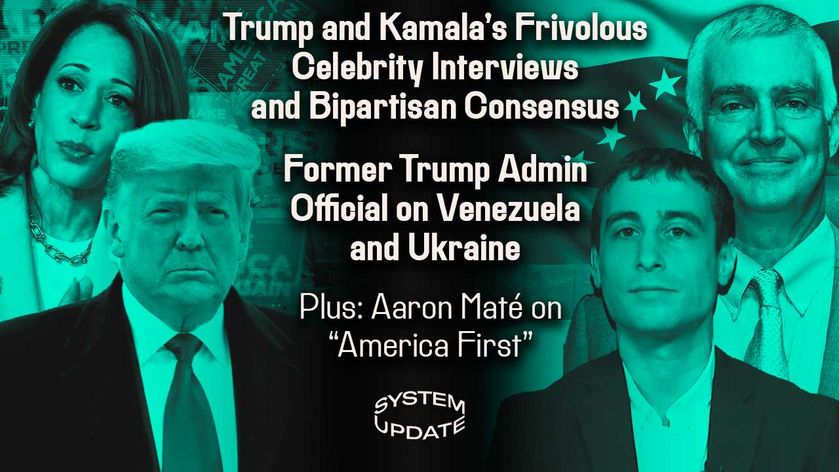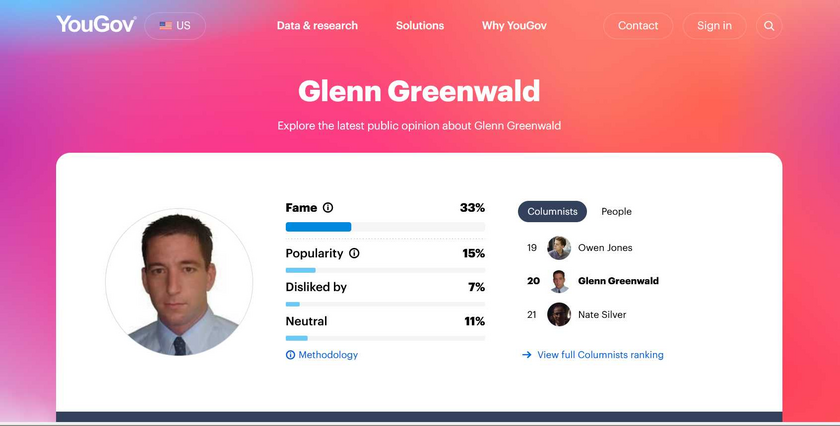Watch the full episode HERE
Interview: Aaron Maté
M. Tracey: All right. Our next guest is Aaron Maté, a household name to many of you, I'm sure. Definitely close to my heart. We're going to get him to comment on his, impressions of my friend Fleitz’s interview, among other things. So, let's go to Aaron.
M. Tracey: Aaron, how's it going?
Aaron Maté: Hey, Michael. How are you doing?
M. Tracey: So, did you listen to that? And if so, what do you make of it? What are some of your impressions?
Aaron Maté: Well, first of all, like all your interviews, you did a great job. And, I just want to say, on behalf of the System Update community, there's a contingent of us who are inspired by Kamala Harris, a new generation taking the reins, replacing the stale, old generation and maybe it's time for regime change also on System Update. I'm just saying.
M. Tracey: Aaron, I've already sent a warning, I've already formally warned Glenn that there's a growing clamor for me to oust him, just as Kamala ousted Joe. So, he better watch his back. Yeah. You never know what might happen.
Aaron Maté: He better. I fully support you. […]
M. Tracey: People are demanding Glenn to pass the torch.
Aaron Maté: Yes. Yes. Well, I'll be marching with them. My impressions of the interview. Well, look, first on Venezuela. What I find just fundamentally wrong about all the discussions of Venezuela or any country targeted by U.S. regime change is who elected Donald Trump or Joe Biden or Mike Pompeo, or Fred Fleitz to make a decision on behalf of the Venezuelan people in this case, who should rule their government and specifically trying to change the government by destroying their economy. I can't think of anything more autocratic. The complaint about Venezuela is that Maduro was an autocrat. I mean, first of all, it ignores that the U.S. has been trying to overthrow Venezuela's government even before Maduro, going back more than two decades. Who elected these people in Washington to decide who should rule over Venezuela? If we cared about the Venezuelan people, we'd mind our own business, let them run their own country. But as you talked about in that Washington Post article, the Trump administration knew that it was consciously destroying Venezuela's economy, because it wanted people to flee, because it wanted to pressure the government to collapse. John Bolton admits that to the Washington Post. And then Trump goes and rails against undocumented immigrants while he's responsible for creating millions of them in Venezuela alone and everywhere else targeted by these sanctions. So just the arrogance that we have the right to destroy other people's economies because their governments are disobedient and because their governments have successfully resisted our regime change efforts going back many years. To me, that has to be called out first. And, you know, if we truly cared about America First, why not focus on our own country and stop trying to destroy other people? That just never makes sense to me.
M. Tracey: And then the other thing, Aaron, is that using the regime change’s own logic, they never achieved their desired outcome, or they very seldom do. Right? So, even if you did want to oust Maduro, it seems pretty clear that the strategy of saddling Venezuela with these massive sanctions on the oil sector, the gold reserves, and other elements of the economy, has been a catastrophic failure in terms of actually ousting him. Right? So, I'm not even saying that ousting him is something that ought to be pursued but if that is what you're pursuing, and over and over again, this tactic of inflicting, as you know, destabilizing and as crippling sanctions as possible doesn't achieve the desired result. You would think maybe you would reexamine it but as the Washington Post series – which was actually very good, sort of an unusual thing or unexpected thing to appear in the Washington Post, but hey, I celebrated it – The obvious addiction to sanctions – and you've covered it with respect to Syria and other places – it very seldom seems to provoke any fundamental reevaluation of the efficacy or utility of that policy program.
So, I couldn't get Fred Fleitz to even really acknowledge that the policy had been a failure. How can you say it's not a failure, even by your own terms, if Maduro is still in power and is declaring he's going to be there again for another six years at minimum? So, yeah, it's very difficult to get people who are invested in the kind of mainline national security paradigm to admit that one of these main tools in their arsenal actually tends to produce far more failure than it does success, quote unquote.
Aaron Maté: Well, let me say, though, in defense of our neocon friends, I do think they still achieve at least some of their goals. One of the goals is to teach a lesson that if your government is going to defy us, defy the so-called rules-based international order, then you're going to suffer. And that has had success. People have suffered in Cuba, Syria, Venezuela and Iran. In Nicaragua, after a decade-long dirty war in the 1980s, people did finally vote out the Sandinistas after they were basically told, if you vote for these people again, you're going to starve. So, it did work there. Also, in a new book by my colleague Anya Parampil, called “Corporate Coup“ which is all about the regime change effort in Venezuela, she points out that there was a major success from the point of view of U.S. coup plotters, the Trump administration and their Venezuelan allies, basically, they expropriated the U.S. assets of Venezuela's oil company, Citgo, which was basically stolen from Venezuela and transferred to Venezuelan allies of the U.S. and the aim there was to basically weaken Venezuela's economy, weaken its power, and take away one of its most valuable assets. At least the U.S. element of Citgo was seized and expropriated in a very Cuban or Soviet-style action, I should say. All of these people talk about how they love the free market, they love capitalism, and they're the biggest interventionist in the market in the world. I mean, that's what sanctions and asset seizures are. It's a massive state intervention, which is an irony that doesn't get discussed here. So, they have achieved some of their reins, if not outright regime change. At least they can impart the lesson. If you defy us, as Venezuela has, and many other disobedient governments, your people will suffer.
M. Tracey: Yeah. So, Aaron, I want to play you a clip. I did many wonderful interviews, as you might have seen at the Republican National Convention a week or so ago. And, I want to play for you a clip from one of them. This is me interviewing Congressman Mike McCaul of Texas. He's the chairman of the House Foreign Affairs Committee. We're talking about Ukraine.

























